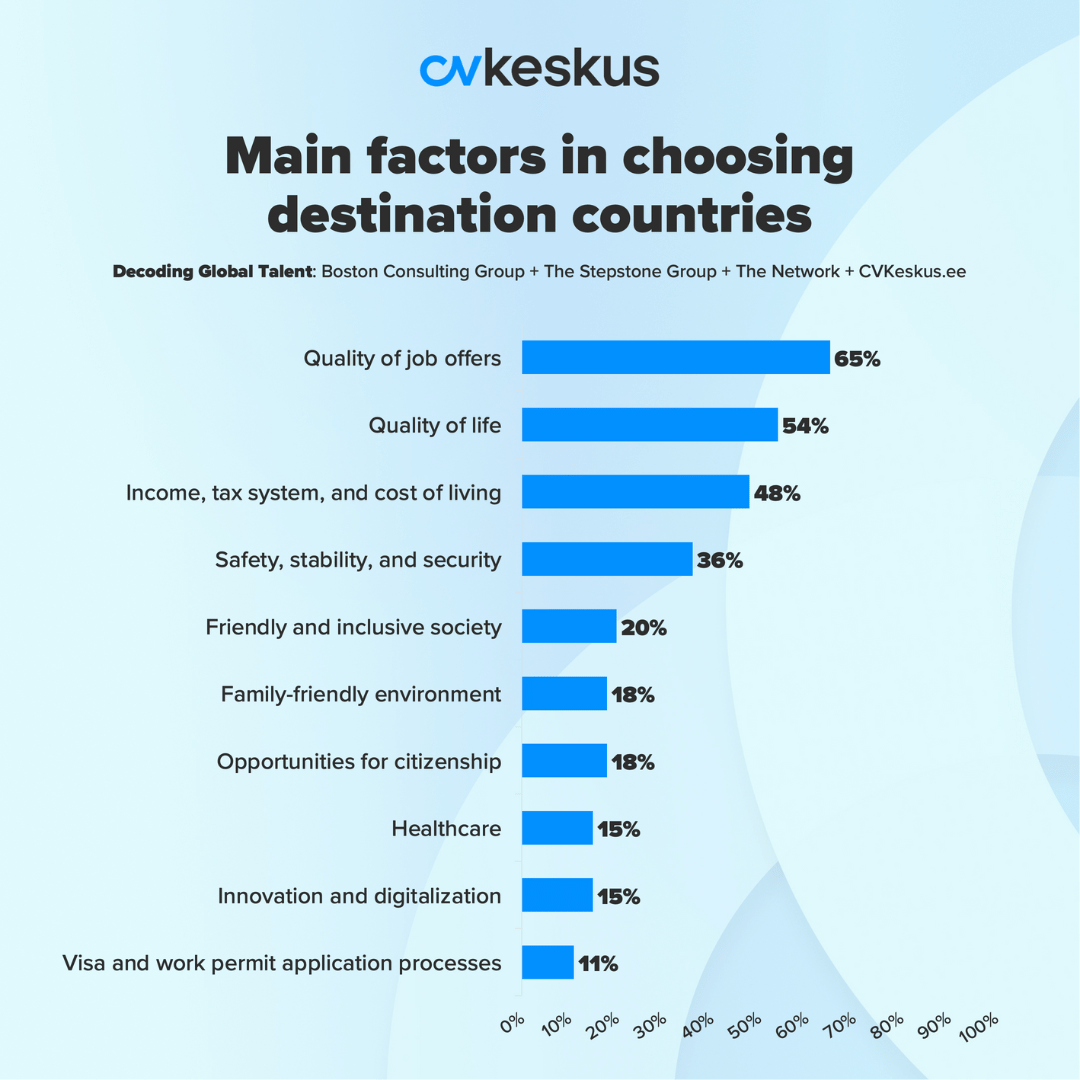How to attract international talent?
Nearly 800 million people worldwide are interested in job opportunities abroad, according to the results of an international labor mobility survey involving over 150,000 employees. Additionally, one in five Estonians is actively looking for job opportunities abroad. What factors make the world's most desirable destinations attract talent?
Considering that 23% of employees globally are actively seeking job opportunities abroad and the international workforce is estimated at 3.55 billion, the survey results suggest that around 800 million employees worldwide are looking for their next job abroad. For comparison, according to Statistics Estonia, there were a total of 9,598 vacant positions in Estonian companies, institutions, and organizations in the first quarter of 2024, which is 16.3% less than in the same period last year. The highest number of vacancies was in the fields of healthcare and social welfare, public administration and defence, and education.
"More than one in five Estonians (22%) are also actively seeking job opportunities abroad, and this figure has risen significantly compared to the surveys from 2018 and 2021, which increases the competition for top talent among Estonian employers," highlighted Grete Adler, Recruitment Manager at the CVKeskus.ee job site. She added that in previous survey years, respectively 10% (in 2018) and 9% (in 2021) of Estonians were interested in job opportunities abroad. Among highly educated individuals, the willingness to move abroad for work is slightly higher at 24%.
Estonians' most desirable destinations differ somewhat from the international workforce's preferences. While the top three attractive countries globally are Australia, the United States, and Canada, Estonians' top three preferences are Finland, Germany, and Spain. Other countries in the top ten for Estonians wishing to relocate for work include Norway, the United States, the United Kingdom, Sweden, Australia, Canada, and Switzerland.
High quality of life, favorable tax environment, and low living costs attract talent
"The main driving factors prompting employees to seek international work are economic – seeking better financial prospects. However, talent is usually attracted by attractive job offers, which was the most decisive factor for job seekers when characterizing the destination country," explained Grete Adler. She added that half of the respondents also considered quality of life, good climate, favorable tax system, and cost of living as important factors.
More than a third of respondents considered security important when choosing their desired destination, and one-fifth valued cultural acceptance and a sense of belonging. For example, Australia has promoted this with the campaign "Racism. It Stops With Me," which provides resources to combat racism and promote cultural diversity in the workplace.
The survey also shows that many respondents expect employers to help integrate their families into the new country, offering support with childcare and finding job opportunities for spouses. For example, Meta offers a program to help employees and their families integrate into a new community, providing language courses, among other things. The importance of a family-friendly environment is also highlighted by expectations that employers will assist with housing, visas, and legal issues, ensuring a smooth transition for the entire family.
The United States leads with attractive job offers, likely influenced by opportunities in the rapidly growing technology sector, but the safety of living in the country was not highly rated.
Australia, considered the world's most desirable destination, was highly valued by employees for the quality of job offers, quality of life, favorable tax system, and the safety and stability of living in the country.
Canada ranked high in the survey due to its convenient visa system and high safety level. Meanwhile, Switzerland, France, and Spain stood out for their high quality of life. The survey reveals that respondents' daily lives are strongly influenced by housing and transport infrastructure, as well as leisure opportunities. Although climate and natural environment are slightly less important, they still play a significant role in shaping the quality of life. Additionally, a good healthcare system, quality education, and overall economic stability are also important factors affecting people's daily lives and satisfaction. These aspects contribute to a general increase in quality of life, making these countries attractive destinations for living and working.

What do employees expect from their future employers when relocating abroad?
The survey results show that inclusive international culture is as important as salary in recruiting international top talent. Additionally, international talents expect the main working language of the future employer to be English and that the employer offers equal job opportunities for international talent as for locals.
Personal recommendations from acquaintances who have lived in the destination country are also important. Employees consider geographical proximity, previous contact with the country, and visa issues less important, expecting employers to help obtain the necessary legal permits.
"When attracting international talent, the expectation to find an inclusive international culture should not be underestimated. It should be part of the employers' value proposition, along with a mentoring program to help employees quickly integrate and adapt abroad," encouraged Grete Adler from CVKeskus.ee.
Decoding Global Talent is an international labor market survey conducted every four years by Boston Consulting Group, The Stepstone Group, and The Network, which includes Estonia's largest job site CVKeskus.ee. The survey aims to understand people's readiness to move abroad for work, identify international talents' expectations for employers and work, and map their preferred destination countries. The 2023 survey involved 150,735 employees from 188 countries.






